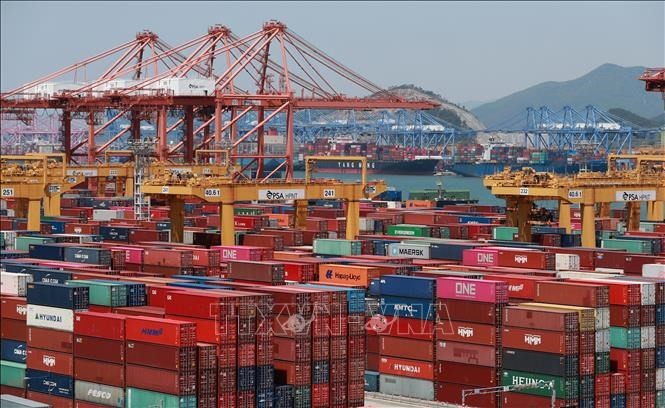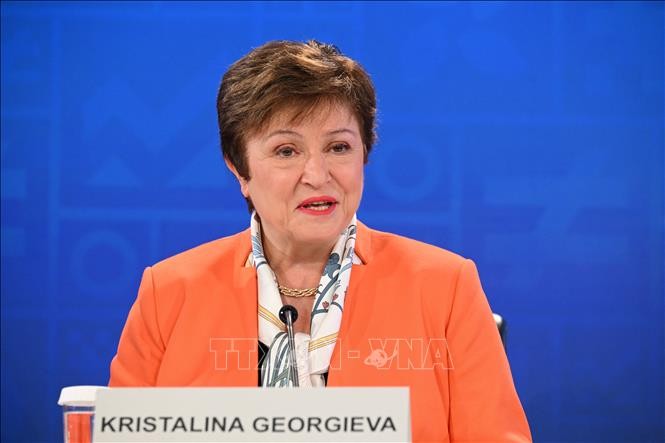(VOVWORLD) - Recent statistics released by global economic and financial organizations show that the global economy is recovering faster than they had projected, thanks to growth drivers in the US and China and visible changes in Europe.
 Containers at Busan, South Korea (Photo: Yonhap/ VNA) Containers at Busan, South Korea (Photo: Yonhap/ VNA) |
The G7 Finance Ministers Meeting said last Saturday that the global economy is recovering faster than expected despite many challenges.
Impressive recovery
The G7's comment is consistent with the relatively optimistic assessment of many international economic and financial organizations recently. In their latest economic outlook reports, the United Nations, the International Monetary Fund, and the Organization for Economic Cooperation and Development all increased their global growth forecast for this year.
In a May 16 report the UN Department of Economic and Social Affairs (DESA) said a number of large, emerging economies grew better than expected in recent months, creating momentum for the global economy to avoid recession and improving the global economic outlook for this year to 2.7%, 0.3 percentage points higher than January’s forecast.
DESA holds that the US, the world's largest economy, might grow 2.3% this year. Chinahas recovered faster than forecast, DESA said, adding that it has revised its growth forecast for the world's second largest economy to 4.8 percent in 2024, 0.1 percentage point higher than the forecast at the beginning of the year.
On Wednesday the IMF adjusted China's growth forecast for this year to 5%, 0.4 percentage points higher than its previous forecast. The basis for the adjustment is China's gross domestic product in Q1 exceeding projections and attaining a growth rate of 5.3%.
Analysts at major banks like BNP Paribas, Goldman Sachs, and Citi Bank, have also increased their forecasts for China’s economy. The economic outlook for emerging and developing economies like India, Brazil, Russia, and Indonesia are also positive.
 IMF Managing Director Kristallina Georgieva (photo: AFP/VNA) IMF Managing Director Kristallina Georgieva (photo: AFP/VNA) |
IMF Managing Director Kristallina Georgieva said: "The world economy has been remarkably resilient despite a more challenging global environment, but better policies need to be in place to avoid entering a decade of sluggish growth and rising debt."
According to the IMF, the faster-than-expected recovery of the global economy can be seen in signs of improvement in several large European economies that have been struggling. In a report published on Tuesday in Berlin, the IMF forecast that the German economy will grow 1-1.5% in the 2025-2026 period. This is a surprisingly positive assessment because Germany recorded negative growth last year and is forecast to grow only 0.2% this year.
The UK’s economy has also begun to improve. Data released by the UK Office for National Statistics on May 10 showed a GDP increase of 0.6% in the first 3 months of this year after 2 consecutive quarters of decline. This was the country’s best growth rate since the fourth quarter of 2021.
Soft landing scenario
While optimistic about the recovery of the world economy, some organizations and economists have also issued warnings. IMF Managing Director Kristallina Georgieva said persistent high inflation, escalating geopolitical tensions, energy price fluctuations, and economic and technological fragmentation pressures still threaten the recovery.
"Globally, we are poised for a soft landing, but the plane is not quite yet on the ground. Central banks need finish the job on inflation by calibrating carefully whether they cut and how fast they cut, against the risk of being too slow and affecting growth negatively,” said Georgieva. She added that: “Countries around the world are in different places on monetary and fiscal policy, so authorities cannot simply take a cue from somebody else. We need to rely on national data to inform the appropriate policy stance.”
The big question now is when major economies like the US, the Eurozone, and the UK will start cutting interest rates? The European Central Bank (ECB) may be planning to cut its interest rate on June 6. The ECB's chief economist, Philip Lane, said that keeping rates overly restrictive for too long could push inflation below the medium-term target of 2%. This would require corrective action through a subsequent acceleration in rate cuts that might require having to descend below neutral levels, Lane said.
More cautious than the ECB, the US Federal Reserve is expected to maintain high interest rates for a longer period and most analysts predict that the FED will cut interest rates at least once at the end of this year.
Despite concerns about high interest rates in major economies that negatively impact global growth, IMF economic counsellor Pierre-Olivier Gourinchas said the risk of a global recession is fairly small and the IMF’s global growth forecast of 3.2% this year is very possible.